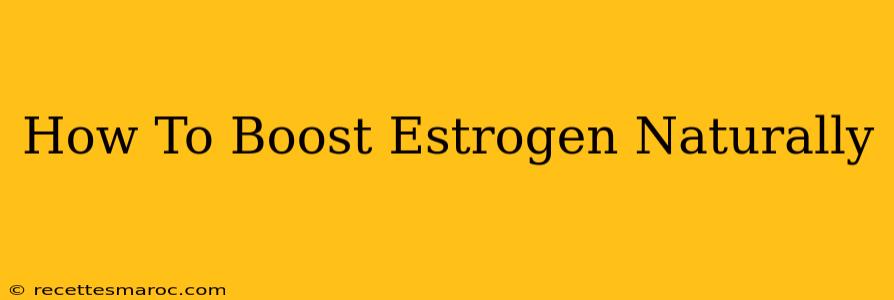Estrogen, a crucial hormone for women's health, plays a vital role in various bodily functions, from menstruation and bone health to mood regulation and sexual function. When estrogen levels dip, women can experience a range of unpleasant symptoms. Luckily, there are several natural ways to boost estrogen levels, promoting overall well-being. This comprehensive guide explores safe and effective methods to increase estrogen naturally.
Understanding Estrogen and Its Importance
Before diving into methods to boost estrogen, understanding its role is crucial. Estrogen is primarily responsible for the development and regulation of the female reproductive system. It also influences:
- Menstrual Cycle: Estrogen regulates the menstrual cycle, ensuring its regularity and preventing irregularities like amenorrhea (absence of menstruation).
- Bone Health: Estrogen protects bones by increasing bone density and reducing bone loss, thus lowering the risk of osteoporosis.
- Cardiovascular Health: Estrogen contributes to healthy cholesterol levels, reducing the risk of heart disease.
- Cognitive Function: Maintaining healthy estrogen levels is associated with better cognitive function and memory.
- Mood and Wellbeing: Estrogen influences mood, contributing to emotional stability and reducing symptoms of anxiety and depression.
- Skin Health: Estrogen contributes to maintaining skin elasticity and hydration.
Low estrogen levels, also known as estrogen deficiency, can lead to various symptoms, including:
- Irregular periods or absent periods
- Hot flashes and night sweats
- Vaginal dryness
- Sleep disturbances
- Mood swings and irritability
- Weight gain
- Loss of libido
- Thinning hair
Natural Ways to Boost Estrogen Levels
Several lifestyle changes and dietary modifications can effectively help boost estrogen naturally. These methods are generally safe and can be incorporated into your daily routine:
1. Dietary Adjustments: Fueling Your Body with Estrogen-Boosting Foods
Phytoestrogens, naturally occurring plant compounds, mimic the effects of estrogen in the body. Incorporating foods rich in phytoestrogens is a key strategy:
- Soy Products: Tofu, edamame, soy milk, and tempeh are excellent sources of isoflavones, a type of phytoestrogen.
- Flaxseeds: These tiny seeds are packed with lignans, another type of phytoestrogen. Adding flaxseeds to your meals or smoothies is a convenient way to boost your intake.
- Whole Grains: Oats, barley, and rye contain phytoestrogens and offer other health benefits.
- Fruits and Vegetables: Apples, berries, carrots, and pomegranates are rich in antioxidants and may contribute to estrogen production.
- Legumes: Lentils, chickpeas, and beans are good sources of phytoestrogens and fiber.
2. Lifestyle Modifications for Optimal Estrogen Balance
Beyond diet, certain lifestyle choices contribute to healthy estrogen levels:
- Manage Stress: Chronic stress can disrupt hormone balance. Practice stress-reducing techniques like yoga, meditation, or deep breathing exercises.
- Prioritize Sleep: Adequate sleep is essential for hormone regulation. Aim for 7-8 hours of quality sleep each night.
- Maintain a Healthy Weight: Obesity is linked to estrogen imbalances. Maintaining a healthy weight through a balanced diet and regular exercise supports hormonal balance.
- Regular Exercise: Regular physical activity, especially weight-bearing exercises, improves overall health and helps maintain estrogen levels. However, avoid over-exercising, as this can negatively impact hormone production.
- Limit Alcohol Consumption: Excessive alcohol consumption can disrupt hormone balance.
3. Herbal Remedies: Exploring Nature's Options (Consult a Healthcare Professional)
Some herbal remedies are traditionally used to support estrogen production. However, it's crucial to consult a healthcare professional before using any herbal remedies, as they can interact with medications or have potential side effects. Some commonly discussed herbs include:
- Red Clover: Contains phytoestrogens.
- Black Cohosh: Used to alleviate menopausal symptoms, but needs careful consideration.
When to Seek Professional Medical Advice
While these natural methods can be effective for many women, it's crucial to seek professional medical advice if you suspect you have low estrogen levels or are experiencing significant symptoms. Your doctor can accurately diagnose the cause of your symptoms and recommend appropriate treatment, which may include hormone replacement therapy (HRT) or other medical interventions in addition to, or instead of, lifestyle changes. Never self-diagnose or self-treat hormonal imbalances.
Disclaimer: This information is for educational purposes only and is not intended as a substitute for professional medical advice. Always consult with your healthcare provider before making any decisions related to your health or treatment.

